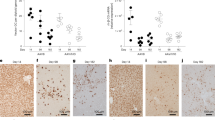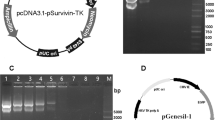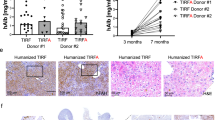Abstract
Gene therapy for hepatocellular carcinoma (HCC) has shown some promise, but its evaluation requires relevant experimental models. With this aim, we present an evaluation of the interest of using the woodchuck model of HCC to assess in vivo gene transfer efficiency. We tested the transduction efficacy of the adenoviral vectors directing lacZ gene product expression under the control of the cytomegalovirus and α-fetoprotein (AFP) regulatory sequences. We have also investigated whether an adenoviral cytomegalovirus-thymidine kinase (Tk) vector might induce an antitumoral effect in this model. Our results demonstrate that with direct intratumoral and intrahepatic arterial injections, transduction of a significant proportion of tumor cells occurred even in large HCC nodules. Furthermore, due to intra-arterial anastomoses, direct intratumoral injection led to transduction of some noninjected HCC nodules. Moreover, direct intratumoral injection of a herpes simplex virus-1 Tk-encoding vector induced, on ganciclovir administration, a significant antitumoral effect in the two animals evaluated. However, in one animal, massive hepatic failure occurred due to Tk expression in nontumor cells. These results emphasize the need to target the expression of the Tk gene to tumor cells using a hepatoma-specific promoter such as AFP promoter. However, we showed that, in vivo, lacZ expression as driven by the AFP promoter was extremely low, thus emphasizing some potential pitfalls when using this approach. Altogether, our data stress the need to test gene therapy-based strategies in such in vivo animal models of HCC and evaluate gene transduction, expression, and biological activity, as well as its potential toxicity.
This is a preview of subscription content, access via your institution
Access options
Subscribe to this journal
Receive 12 print issues and online access
$259.00 per year
only $21.58 per issue
Buy this article
- Purchase on Springer Link
- Instant access to full article PDF
Prices may be subject to local taxes which are calculated during checkout
Similar content being viewed by others
Author information
Authors and Affiliations
Corresponding author
Rights and permissions
About this article
Cite this article
Bilbao, R., Gérolami, R., Bralet, MP. et al. Transduction efficacy, antitumoral effect, and toxicity of adenovirus-mediated herpes simplex virus thymidine kinase/ganciclovir therapy of hepatocellular carcinoma: The woodchuck animal model. Cancer Gene Ther 7, 657–662 (2000). https://doi.org/10.1038/sj.cgt.7700175
Received:
Accepted:
Published:
Issue Date:
DOI: https://doi.org/10.1038/sj.cgt.7700175
Keywords
This article is cited by
-
Prevention of liver tumor formation in woodchucks with established hepatocellular carcinoma by treatment with cationic liposome-DNA complexes
BMC Cancer (2017)
-
In Vitro Radionuclide Therapy and In Vivo Scintigraphic Imaging of Alpha-Fetoprotein-Producing Hepatocellular Carcinoma by Targeted Sodium Iodide Symporter Gene Expression
Nuclear Medicine and Molecular Imaging (2013)
-
A phase I clinical trial of thymidine kinase-based gene therapy in advanced hepatocellular carcinoma
Cancer Gene Therapy (2010)
-
Gene therapy of hepatocarcinoma: a long way from the concept to the therapeutical impact
Cancer Gene Therapy (2003)
-
Hepatoma cell-specific ganciclovir-mediated toxicity of a lentivirally transduced HSV-TkEGFP fusion protein gene placed under the control of rat alpha-fetoprotein gene regulatory sequences
Cancer Gene Therapy (2003)



